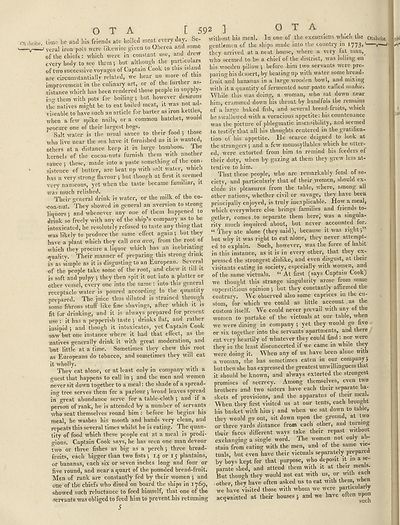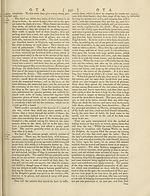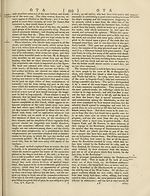Encyclopaedia Britannica > Volume 15, NIC-PAR
(668) Page 592
Download files
Complete book:
Individual page:
Thumbnail gallery: Grid view | List view

OTA
[ 592 1
OTA
time he and his friends ate boiled meat every day. Se¬
veral iron pots were likewise given to Oberea and some
of the chiefs : which were in constant use, and drew
every body to see them j but although the particulars
of two successive Voyages of Captain Cook to tins islan
are circumstantially related, we hear no more ot tins
improvement in the culinary art, or ot the iurther as¬
sistance which has been rendered those people m supply¬
ing them with pots for boiling 5 but however desirous
the natives might be to eat boiled meat, it rvas not ai -
viseable to have such an article for barter as iron kettles,
when a few spike nails, or a common hatchet, would
procure one ol their largest bogs. .
Salt water is the usual sauce to their food 5 those
who live near the sea have it furnished as it is wanted,
others at a distance keep it in large bamboos. Ihe
kernels of the cocoa-nuts furnish them with another
sauce these, made into a paste something of the con¬
sistence cf butter, are heat up with salt water, whic.i
has a very strong flavour j but though at first it seemed
very nauseous, yet when the taste became familiar, it
was much relished.
Their general drink is water, or the milk ot the co-
vcoa-nut. They showed in general an aversion to strong
liquors ; and whenever any one of them happened to
drink so freely with any of the ship’s company as to he
intoxicated, he resolutely refused to taste any thing that
was likely to produce the same elfect again 5 hut they
have a plant which they call ova avo, from the root ot
which they procure a liquor which has an inebriating
quality. Their manner of preparing this strong drink
is as simple as it is disgusting to an European. Several
of the people take some of the root, and chew it till it
is soft and pulpy j they then spit it out into a platter or
other vessel, every one into the same: into this general
receptacle water is poured according to the quantity
prepared. The juice thus diluted is strained through
some fibrous stuff like fine shavings, after which it is
fit for drinking, and it is always prepared for present
use : it has a pepperish taste ; drinks Hat, and rather
insipid j and though it intoxicates, yet Captain Cook
saw but one instance where it had that effect, as the
natives generally drink it with great moderation, and
but little at a time. Sometimes they chew this root
as Europeans do tobacco, and sometimes they will eat
it wholly.
They eat alone, or at least only in company with a
guest that happens to call in $ and the men and women
never sit down together to a meal: the shade of a spread¬
ing tree serves them for a parlour $ broad leaves spread
in great abundance serve for a table-cloth j and if a
person of rank, he is attended by a number of servants
who seat themselves round him : before he begins his
meal, he washes his mouth and hands very clean, and
repeats this several times whilst he is eating. The quan¬
tity of food which these people eat at a meal is prodi¬
gious. Captain Cook says, he has seen one man devour
two or three fishes as big as a perch j three bread¬
fruits, each bigger than two fists; 14 or 15 plantains,
or bananas, each six or seven inches long and four or
five round, and near a quart of the pounded bread-fruit.
Men of rank are constantly fed by their women ; and
one of the chiefs who dined on board the ships in 1769,
showed such reluctance to feed himself, that one of the
servants was obliged to feed him to prevent his returning
5
without his meal. In one of the excursions which the Otakite.
gentlemen of the ships made into the country in 1773,'—sr—J
they arrived at a neat house, where a very fat man,,
who seemed to be a chief 0! the district, was lolling on
his wooden pillow; before him two servants were pre¬
paring his dessert, by heating up with water some bread¬
fruit and bananas in a large wooden howl, and mixing
with it a quantity of fermented sour paste called mahic.
While this was doing, a woman, who sat down near
him, crammed down his throat by handfuls the remains
of a lar^e baked fish, and several bread-fruits, which
he swallowed with a voracious appetite: his countenance
was the picture of phlegmatic insensibility, and seemed
lo testifv that all his thoughts centered in the gratifica¬
tion of his appetite. He scarce deigned to look at
the strangers ; and a few monosyllables which he utter¬
ed, were extorted from him to remind his feeders of
their duty, when by gazing at them they grew less at¬
tentive to him.
That these people, who are remarkably fond of so¬
ciety, and particularly that ot theirjwomen, should ex¬
clude- its pleasures from the table, where, among all
other nations, whether civil or savage, they have been
principally enjoyed, is truly inexplicable. How a meal,
which everywhere else brings families and friends to¬
gether, comes to separate them here, was a singula¬
rity much inquired about, hut never accounted for.
“ They ate alone (they said), because it was light;
hut why it was right to eat alone, they never attempt¬
ed to explain. Such, however, was the force of habit
in this instance, as it is in every other, that the} ex¬
pressed the strongest dislike, and even disgust, at theii
visitants eating in society, especially with women, and
of the same victuals. “ At first (says Captain Cook;
we thought this strange singularity arose from some
superstitious opinion ; hut they constantly affirmed the
contrary. We observed also some caprices in the cu¬
stom, for which we could as little account as the
custom itself. We could never prevail with any of the
women to partake of the victuals at our table, when
we were dining in company ; yet they would go five
or six together into the servants apartments, and there
eat very heartily of whatever they could find : nor w'ere
they in the least disconcerted if we came in while they
were doing it. W hen any ot us have been alone vvit
a woman, she has sometimes eaten in our company;
but then she has expressed the greatest unwillingness that
it should be known, and always extorted the strongest
promises of secrecy. Among themselves, even two
brothers and two sisters have each their separate ba¬
skets of provisions, and the apparatus of their meal.
When they first visited us at our tents, each brought
his basket with him ; and when we sat down to table,
they would go out, sit down upon the ground, at two
or three yards distance from each other, and turning
their faces different ways take their repast without
exchanging a single word. The women not only ab¬
stain from eating with the men, and of the same vic¬
tuals, but even have their victuals separately prepared
by boys kept for that purpose, who deposit it in a se¬
parate shed, and attend them with it at their meals.
But though they would not eat with us, or with each
other, they have often asked us to eat with them, when
we have visited those with whom we were particularly
acquainted at their houses; and we have often upon
[ 592 1
OTA
time he and his friends ate boiled meat every day. Se¬
veral iron pots were likewise given to Oberea and some
of the chiefs : which were in constant use, and drew
every body to see them j but although the particulars
of two successive Voyages of Captain Cook to tins islan
are circumstantially related, we hear no more ot tins
improvement in the culinary art, or ot the iurther as¬
sistance which has been rendered those people m supply¬
ing them with pots for boiling 5 but however desirous
the natives might be to eat boiled meat, it rvas not ai -
viseable to have such an article for barter as iron kettles,
when a few spike nails, or a common hatchet, would
procure one ol their largest bogs. .
Salt water is the usual sauce to their food 5 those
who live near the sea have it furnished as it is wanted,
others at a distance keep it in large bamboos. Ihe
kernels of the cocoa-nuts furnish them with another
sauce these, made into a paste something of the con¬
sistence cf butter, are heat up with salt water, whic.i
has a very strong flavour j but though at first it seemed
very nauseous, yet when the taste became familiar, it
was much relished.
Their general drink is water, or the milk ot the co-
vcoa-nut. They showed in general an aversion to strong
liquors ; and whenever any one of them happened to
drink so freely with any of the ship’s company as to he
intoxicated, he resolutely refused to taste any thing that
was likely to produce the same elfect again 5 hut they
have a plant which they call ova avo, from the root ot
which they procure a liquor which has an inebriating
quality. Their manner of preparing this strong drink
is as simple as it is disgusting to an European. Several
of the people take some of the root, and chew it till it
is soft and pulpy j they then spit it out into a platter or
other vessel, every one into the same: into this general
receptacle water is poured according to the quantity
prepared. The juice thus diluted is strained through
some fibrous stuff like fine shavings, after which it is
fit for drinking, and it is always prepared for present
use : it has a pepperish taste ; drinks Hat, and rather
insipid j and though it intoxicates, yet Captain Cook
saw but one instance where it had that effect, as the
natives generally drink it with great moderation, and
but little at a time. Sometimes they chew this root
as Europeans do tobacco, and sometimes they will eat
it wholly.
They eat alone, or at least only in company with a
guest that happens to call in $ and the men and women
never sit down together to a meal: the shade of a spread¬
ing tree serves them for a parlour $ broad leaves spread
in great abundance serve for a table-cloth j and if a
person of rank, he is attended by a number of servants
who seat themselves round him : before he begins his
meal, he washes his mouth and hands very clean, and
repeats this several times whilst he is eating. The quan¬
tity of food which these people eat at a meal is prodi¬
gious. Captain Cook says, he has seen one man devour
two or three fishes as big as a perch j three bread¬
fruits, each bigger than two fists; 14 or 15 plantains,
or bananas, each six or seven inches long and four or
five round, and near a quart of the pounded bread-fruit.
Men of rank are constantly fed by their women ; and
one of the chiefs who dined on board the ships in 1769,
showed such reluctance to feed himself, that one of the
servants was obliged to feed him to prevent his returning
5
without his meal. In one of the excursions which the Otakite.
gentlemen of the ships made into the country in 1773,'—sr—J
they arrived at a neat house, where a very fat man,,
who seemed to be a chief 0! the district, was lolling on
his wooden pillow; before him two servants were pre¬
paring his dessert, by heating up with water some bread¬
fruit and bananas in a large wooden howl, and mixing
with it a quantity of fermented sour paste called mahic.
While this was doing, a woman, who sat down near
him, crammed down his throat by handfuls the remains
of a lar^e baked fish, and several bread-fruits, which
he swallowed with a voracious appetite: his countenance
was the picture of phlegmatic insensibility, and seemed
lo testifv that all his thoughts centered in the gratifica¬
tion of his appetite. He scarce deigned to look at
the strangers ; and a few monosyllables which he utter¬
ed, were extorted from him to remind his feeders of
their duty, when by gazing at them they grew less at¬
tentive to him.
That these people, who are remarkably fond of so¬
ciety, and particularly that ot theirjwomen, should ex¬
clude- its pleasures from the table, where, among all
other nations, whether civil or savage, they have been
principally enjoyed, is truly inexplicable. How a meal,
which everywhere else brings families and friends to¬
gether, comes to separate them here, was a singula¬
rity much inquired about, hut never accounted for.
“ They ate alone (they said), because it was light;
hut why it was right to eat alone, they never attempt¬
ed to explain. Such, however, was the force of habit
in this instance, as it is in every other, that the} ex¬
pressed the strongest dislike, and even disgust, at theii
visitants eating in society, especially with women, and
of the same victuals. “ At first (says Captain Cook;
we thought this strange singularity arose from some
superstitious opinion ; hut they constantly affirmed the
contrary. We observed also some caprices in the cu¬
stom, for which we could as little account as the
custom itself. We could never prevail with any of the
women to partake of the victuals at our table, when
we were dining in company ; yet they would go five
or six together into the servants apartments, and there
eat very heartily of whatever they could find : nor w'ere
they in the least disconcerted if we came in while they
were doing it. W hen any ot us have been alone vvit
a woman, she has sometimes eaten in our company;
but then she has expressed the greatest unwillingness that
it should be known, and always extorted the strongest
promises of secrecy. Among themselves, even two
brothers and two sisters have each their separate ba¬
skets of provisions, and the apparatus of their meal.
When they first visited us at our tents, each brought
his basket with him ; and when we sat down to table,
they would go out, sit down upon the ground, at two
or three yards distance from each other, and turning
their faces different ways take their repast without
exchanging a single word. The women not only ab¬
stain from eating with the men, and of the same vic¬
tuals, but even have their victuals separately prepared
by boys kept for that purpose, who deposit it in a se¬
parate shed, and attend them with it at their meals.
But though they would not eat with us, or with each
other, they have often asked us to eat with them, when
we have visited those with whom we were particularly
acquainted at their houses; and we have often upon
Set display mode to:
![]() Universal Viewer |
Universal Viewer | ![]() Mirador |
Large image | Transcription
Mirador |
Large image | Transcription
Images and transcriptions on this page, including medium image downloads, may be used under the Creative Commons Attribution 4.0 International Licence unless otherwise stated. ![]()
| Encyclopaedia Britannica > Encyclopaedia Britannica > Volume 15, NIC-PAR > (668) Page 592 |
|---|
| Permanent URL | https://digital.nls.uk/192590382 |
|---|
| Attribution and copyright: |
|
|---|
| Shelfmark | EB.11 |
|---|---|
| Description | Ten editions of 'Encyclopaedia Britannica', issued from 1768-1903, in 231 volumes. Originally issued in 100 weekly parts (3 volumes) between 1768 and 1771 by publishers: Colin Macfarquhar and Andrew Bell (Edinburgh); editor: William Smellie: engraver: Andrew Bell. Expanded editions in the 19th century featured more volumes and contributions from leading experts in their fields. Managed and published in Edinburgh up to the 9th edition (25 volumes, from 1875-1889); the 10th edition (1902-1903) re-issued the 9th edition, with 11 supplementary volumes. |
|---|---|
| Additional NLS resources: |
|

